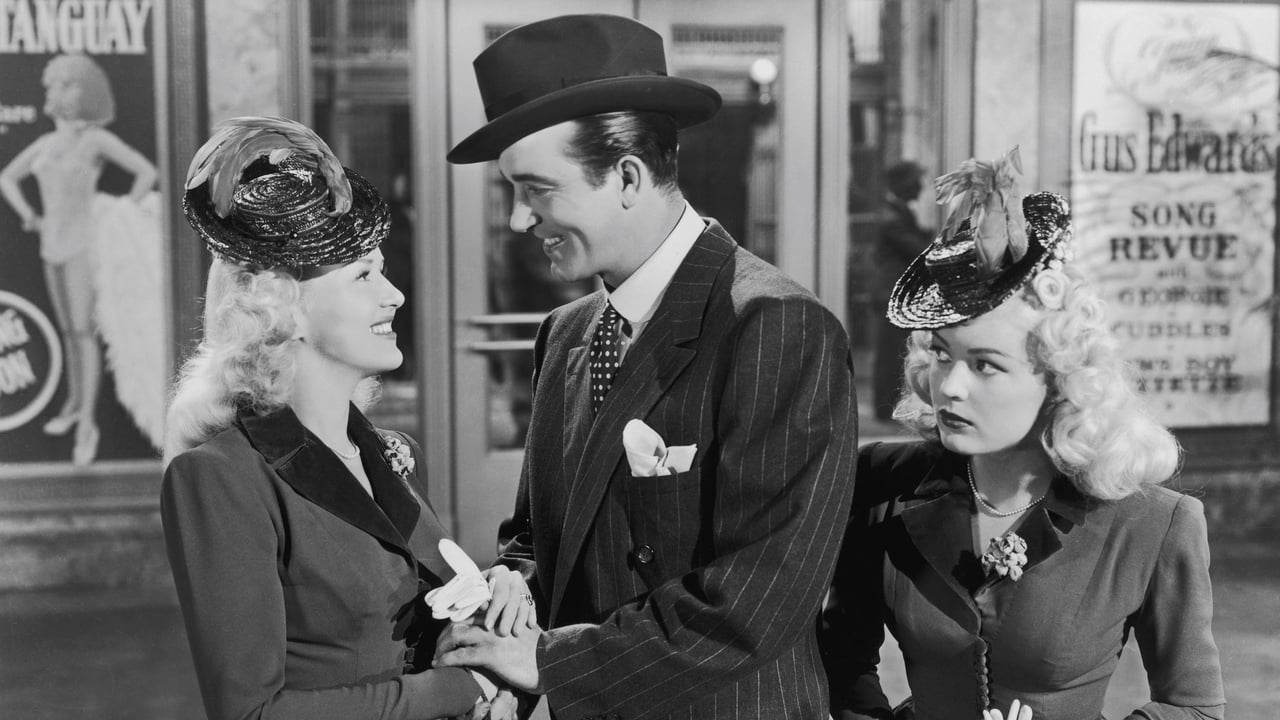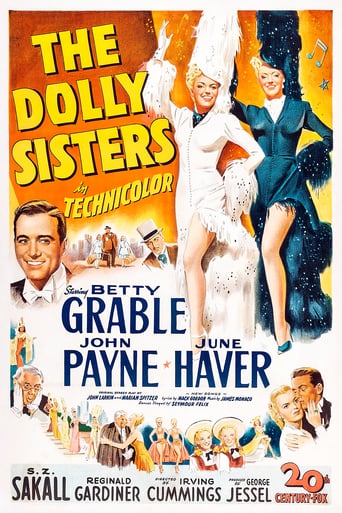

What makes it different from others?
... View MoreExcellent, smart action film.
... View MoreYour blood may run cold, but you now find yourself pinioned to the story.
... View MoreIf you're interested in the topic at hand, you should just watch it and judge yourself because the reviews have gone very biased by people that didn't even watch it and just hate (or love) the creator. I liked it, it was well written, narrated, and directed and it was about a topic that interests me.
... View MoreIt's big, it's Technicolor. June Haver and Betty Gable have great legs. The staging and the music are top. The movie made lots of money. What's wrong? This Biographical picture is so fictionalized that it does not do the Dolly sisters the correct way.Granted doing it better might have to depict suicide which both sisters attempted quite graphically. The real story does deserve more than it gets here. The script is way too Hollywood to give an audience a feel good story and not anywhere near the truth. To me the real sisters are more like the Gabor sisters than depicted here. In real life they are Brunettes and short, not tall and blonde. The best depiction in the movie is Harry Fox.Neat to see Elmira, NY, mentioned early in the film. Not sure about any real event there as that location does not seem to be in any internet account of any of these folks. It is possible though Elmira has more to do with Mark Twain and later Ernie Davis than the Dolly Sisters or Fox.Mila Kunis would be the brunette I'd choose to be a Dolly Sister in a remake. She is short and would definitely light up the screen. I am not sure who her twin co-star would be. Aston Kutcher as Harry Fox? I think there are male actors who would be better. It would be a fun film to do a costume remake of with this generation trying to recreate the past. This old one is a Grable formula remake. Though it is pretty, I think it could be done even better. I am sure the real story and a more real script would benefit this material.
... View MoreFictionalized, romanticized tale of the real-life Dolly Sisters, Hungarian siblings who arrived in the States as little girls in 1904 and grew up to be international showgirls. Story reconfigured as a star-vehicle for Betty Grable, who looks terrific and gives one of her better, less unctuous performances. June Haver, as kid sis Rosie, matches up well alongside Grable, yet the two actresses are rarely in sync during their musical numbers; worse, the character of Rosie is under-developed, and her actions in the final reel are unclear. The tacky color production doesn't help but the supporting players do, with John Payne well-cast as songwriter Harry Fox who marries Grable's Jenny before leaving for duty in WWI. The picture's time-line is fuzzy, and the reunion finale is limp, however several of the stage numbers have spirit, particularly a Cotton Club-styled production and a batty Ziegfeld extravaganza. Twentieth Century-Fox did a paste-up job on most of the picture, undercutting the drama with winking camp, but Grable works hard and makes it worthwhile. ** from ****
... View MoreThe Dolly Sisters is another of those nostalgic biographical film salutes to a pair of twin sisters from Hungary who became celebrated entertainers in those years before World War I and the Roaring Twenties. Both sisters had a few marriages and suffered many ups and downs in their lives. Of course this being Hollywood we're getting quite a sanitized version of them.They were in fact identical twins, but 20th Century Fox did not decide to cast one actress in both roles. Originally it was supposed to be Alice Faye and Betty Grable, but Alice took her screen retirement when Darryl Zanuck would not give her more dramatic roles and June Haver was brought in to replace. Both Grable and Haver had their hair done in the same style, wore the same outfits all the time and my guess was that Haver who was slightly smaller wore platforms to give her equal height or almost equal height with Grable.A lot of interpolated period music is used, but Jimmy Monaco and Mack Gordon wrote one original song I Can't Begin To Tell You which was nominated for an Oscar. It also has the unique distinction of being the only song Betty Grable commercially recorded during her stint at Fox because Zanuck did not like his stars singing for records. She did a vocal with her husband Harry James's band under a pseudonym at the time. Later releases credit Betty. But the big selling record of this song was by Bing Crosby with only a piano accompaniment by Carmen Cavallaro. It was one of Bing's biggest sellers. It's sung at various times in the film by Betty, June and John Payne and a few combinations thereof.John Payne plays Harry Fox, song and dance man who Grable marries and leaves. In real life they never got back together which is what the film alludes to. Also it shows Fox as being jealous of the success of the sisters. In fact he was a success before they were and Jenny Dolly was accused of marrying him to boost her career. In fact that was an accusation leveled at both sisters who made a few advantageous matches.In real life there was no happy ending for Jenny Dolly, she committed suicide in 1941, she was in a lot of pain and never recovered from the automobile accident that Betty Grable was shown to have. Rosie Dolly's final marriage was to a department store heir and she survived her sister by 29 years.Since much was made in real life of the sister's Hungarian ancestry you had to have S.Z. Sakall in this film as their lovable uncle who's constantly losing money at pinochle. My grandfather was a heavy pinochle player as well so it's something I could identify with. Sakall was with Warner Brothers at the time and I'd love to know what Darryl Zanuck had to give in return to Jack Warner for Sakall's services. As always Sakall is his lovable self, you could just reach into the TV to pinch his cheeks.The Dolly Sisters is a fine nostalgic and sanitized biographical film with a lot of gaudy color for a pair of gaudy sisters. It should only have gone this easy for the real Dolly Sisters.
... View MoreBetty Grable and June Haver are "The Dolly Sisters" in this 1945 film also starring John Payne, S.Z. Sakall and Reginald Gardner. Grable enjoyed an unparalleled run - 10 years in a row - in the Hollywood top ten box office, from 1941 to 1951, yet when Turner Classic Movies published their Unforgettable Leading Ladies of the Studio Era book, Grable was left out. For anyone who believes - erroneously - that Turner Classic Movies has any interest in film history, she was left out - just as Tyrone Power was left out of the leading men book - because TCM doesn't own their films.Not realizing that for a huge audience later on, it wouldn't exist, 20th Century Fox spared no expense for this lavish color musical about two real-life Hungarian sisters (actually brunettes) who were big entertainers in the beginning of the century. The story focuses on Jenny Dolly (Grable) primarily and her romance and marriage to Ziegfeld performer Harry Fox (inventor of the "fox trot"), played by John Payne, and how World War I and career separations destroyed their marriage.Grable and Haver look just like sisters and are marvelous together, wearing gorgeous costumes and looking fabulous and radiant throughout. Both bring a lot of energy to their roles. Payne does a good job as Harry, singing and acting well. A versatile actor, he could not only appear in musicals where he did his own singing, but he did plenty of drama and was also a hunk. He was invaluable to Fox during the war years.This is a very entertaining film, but it's a shame that a film on the true story of the Dolly Sisters has never been made. Jenny and Fox were divorced in 1921. She was indeed involved in a car accident with an ex-boyfriend in 1933 and had to sell her jewels to pay for many surgeries, but unlike the film, she never really recovered. She never reconciled with Fox and in 1941, she hung herself. Rosie did marry a Chicago businessman; she attempted suicide in 1962, though it failed, and she died in 1970. The two women were huge gamblers, only hinted at in the film, and made a fortune: They won $850,000 in one season at Deauville and one evening in Cannes, Jenny won 4 million francs, which she converted to a collection of jewelry, and then went on to win another 11 million more francs.I suppose during World War II, no one would have been interested in such a downer, so it's just as well that we have this film, which gives us vibrant entertainment in the best 20th Century Fox tradition.
... View More